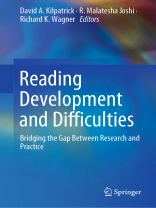This book provides an overview of current research on the development of reading skills as well as practices to assist educational professionals with assessment, prevention, and intervention for students with reading difficulties. The book reviews the Componential Model of Reading (CMR) and provides assessment techniques, instructional recommendations, and application models. It pinpoints specific cognitive, psychological, and environmental deficits contributing to low reading skills, so educators can accurately identify student problems and design and implement appropriate interventions. Chapters offer methods for assessing problems in decoding, word and sound recognition, and comprehension. In addition, chapters emphasize the recognition of student individuality as readers and learners, from understanding distinctions between difficulties and disabilities to the effects of first-language orthography on second-language learning.
Topics featured in this book include:
- Learning the structure of language at the word level.
- Reading comprehension and reading comprehension difficulties
- Assessing reading in second language learners.
- Effective prevention and intervention for word-level reading difficulties.
- The neurobiological nature of developmental dyslexia.
Reading Development and Difficulties is a must-have resource for researchers, practitioners, and graduate students in varied fields, including child and school psychology; assessment, testing, and evaluation; social work; and special education.
‘I think the book has the potential to be a game changer. It will certainly challenge the expectations of policy makers, not to mention the teachers of beginning readers. These chapters will enhance the knowledge base of those in our schools who are charged with the lofty task of assuring that children have the best possible opportunitiesto acquire the skill of reading.”
Sir Jim Rose
Chair and author of Independent Review of the Teaching of Early Reading: Final Report (2006)
Table des matières
Section I: Reading Development and Difficulties .- Chapter 1. Componential Model of Reading (CMR): Implications for Assessment and Instruction of Literacy Problems.- Chapter 3. Phonics and Spelling: Learning the Structure of Language at the Word Level.- Chapter 4. Orthographic Mapping Facilitates Sight Word Memory and Vocabulary Learning.- Chapter 5. Reading Comprehension and Reading Comprehension Difficulties.- Chapter 6. Assessing Reading in Second Language Learners: Development, Validity, and Educational Considerations.-
Section II: Assessment and Intervention .- Chapter 7. The Identification of Reading Disabilities.- Chapter 8. Effective Prevention and Intervention for Word-Level Reading Difficulties.-
Section III: Biological Perspectives .- Chapter 9. Behavior-Genetic Studies of Literacy Development: A Commentary for Professionals in Psychology and Education.- Chapter 10. The Neurobiological Strands of Developmental Dyslexia: What We Know and What We Don’t Know.
A propos de l’auteur
David A. Kilpatrick, Ph.D., is Professor of Psychology at the State University of New York College at Cortland. He has been teaching courses on learning disabilities for more than 20 years. Dr. Kilpatrick is also a New York State certified school psychologist and has conducted hundreds of evaluations of students with learning disabilities. He received his doctorate in psychology from Syracuse University. Dr. Kilpatrick is the author of Essentials of Assessing, Preventing, and Overcoming Reading Difficulties (Wiley & Sons, 2015) and Equipped for Reading Success (Casey & Kirsch, 2016).
R. Malatesha Joshi, Ph.D., is Professor of Reading/Language Arts Education, ESL, and Educational Psychology at Texas A&M. He is the Editor of the Reading and Writing: An Interdisciplinary Journal, co-author with P. G. Aaron and D. Quatroche of Becoming a Professional Reading Teacher (Brookes, 2008), and the Series Editor of Springer’s Literacy Studies: Perspectives from Cognitive Neurosciences, Linguistics, Psychology, and Education.
Richard K. Wagner, Ph.D., is Distinguished Professor of Psychology at Florida State University and Associate Director of the Florida Center for Reading Research. He is the author or co-author of more than 100 scientific research articles on reading, and author or editor of several books. Dr. Wagner is a co-author of the Comprehensive Test of Phonological Processing–Second Edition (CTOPP-2) and the Test of Word Reading Efficiency–Second Edition (TOWRE-2). In 2012, Dr. Wagner and his colleague Joseph Torgesen, Ph.D., were co-recipients of the Distinguished Scientific Contributions award from the Society for the Scientific Study of Reading.












